条件式现在时,过去时
法语基础动词变位大全
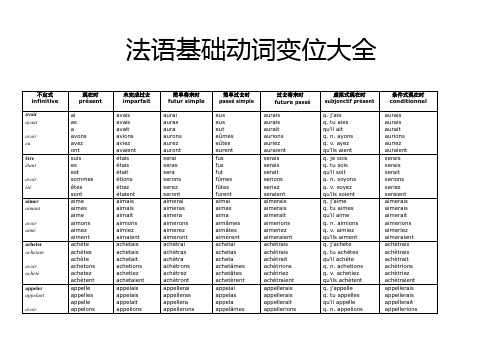
条件式现在时和过去时

条件式现在时和过去时在沪江关注法语的沪友chenjiaqi222遇到了一个关于法语语法的疑惑,已有2人提出了自己的看法。
知识点疑惑描述:条件式现在时和过去时用在独立句中,表示委婉请求,常用动词(vouloir、pouvoir、aimer),那怎么区分什么时候用哪一种?eg:1.J'aurais aime partir demain: c'est possible?2.Vous ne pourriez vraiment pas me trouver une place?另外,考试中选填条件式现在时或过去时,有哪些特别要注意的区别呢?语法书都快看蒙了。
怎么感觉两个差不多。
谢谢知识点相关讲解条件式现在时和过去时比较明显的区别在于:条件式现在时是未完成体,指现在或将来可能做的事;条件式过去时是完成体,指现在、将来或过去可能已做完的事。
例如:Un tel travail demanderait plusieurs mois.(这样的活儿可能得干好几个月。
)Un tel travail aurait demandé plusieurs mois.(这样的活儿可能用了好几个月。
)只能用条件式现在时的情况:①表示愿望,希望,例如:Félix et Béatrice aimeraient avoir un deuxième enfant. (Félix et Béatrice希望生第二个孩子。
)②一个想象的动作,例如:Julien rêve d’habiter à Paris. Son appartement se trouverait au Quartier latin, ses fenêtres donneraient sur un jardin.(Julien梦想住在巴黎,公寓能建在拉丁区,窗户可以朝向花园。
常用法语时态汇总

常用法语时态大全一、直陈式 Indicatif1、现在时 le present描写发生的动作或状态,表达习惯性动作,描述真理L'eau gèle à 0°C,分析作品Dans Le père Goriot, Balzac peint un amour paternel passionné.用在以si引导的假设从句里→Ce tt e plage est belle. Si tu l'aime, tu peux prendre des photos. 2、 复合过去时 Passé Composé表示过去一定时刻完成的动作→Napoléon est né en Corse en 1769.连续的事件→Après le rendez-vous, j'ai quitté le restaurant et tout à coup, j'ai vu mon père. (连续事件常用一些时间副词强调:alors, puis, ensuite, après, tout à coup, etc.)重复性→J'ai vu ce film 4 fois.有限的延续→Elle a fait son choix en 5 minutes.表示一个延续到现在时刻已完成的动作→Ils ont acheté une grande maison: ils ont beaucoup de travaux à y faire.复合过去时与未完成过去时区别:动作都发生在过去,表示已经发生且完成了的用复合过去时;表示延续的,正在进行的,不知道何时结束的用未完成过去时。
Je lisais quand elle est entrée dans mon bureau.若两个动作都表示正在进行,延续着,那么都使用未完成过去时。
Le conditionel
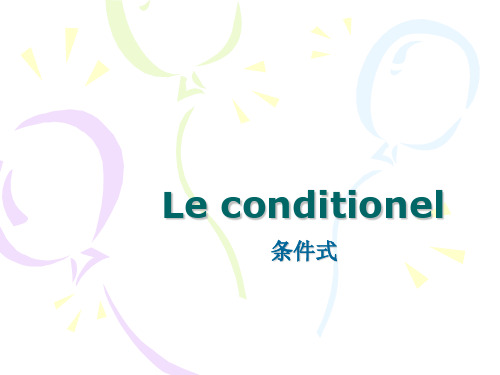
***
• 条件式现在时的词形可用来表示直陈式过 去将来时的时态。 Il m'a dit que sa cousine viendrait dix jours plus tard. Je ne savais pas s'il sérait guéri.
Conditionel passé passé
***
• 条件式过去时用于主从复合句: si+从句(plus-que-parfait),主句 (conditionel passé) 表示在某种条件下过去没能实现而事后设想 的动作或状况。
***
• Si je l'avais connue un peu plus tôt, je l'aurais épousée. • S'il avait su que sa maladie était si grave, il aurait pu voir le docteur plus tôt.
直陈式和条件式的比较
• Je connais quelqu'un qui peut t'aider. • Je connais quelqu'un qui pourrait t'aider.
***
• Elle parle si bien allemand qu'on la prend souvent pour une Allemande. • Elle parle si bien allemand qu'on la prendrait pour une Allemande.
***
• 表示礼貌(一般用于请求)(politesse)。 Pourriez-vous monter mes valises dans ma chambre? Je voudrais un renseignement.
法语动词六种语式
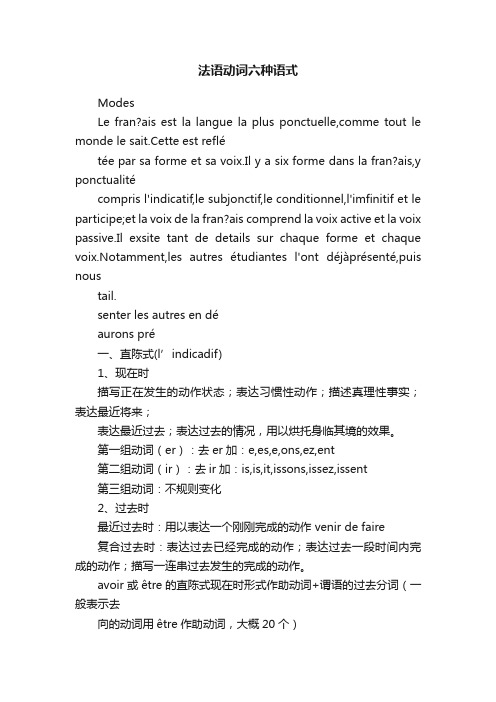
法语动词六种语式ModesLe fran?ais est la langue la plus ponctuelle,comme tout le monde le sait.Cette est reflétée par sa forme et sa voix.Il y a six forme dans la fran?ais,y ponctualitécompris l'indicatif,le subjonctif,le conditionnel,l'imfinitif et le participe;et la voix de la fran?ais comprend la voix active et la voix passive.Il exsite tant de details sur chaque forme et chaque voix.Notamment,les autres étudiantes l'ont déjàprésenté,puis noustail.senter les autres en déaurons pré一、直陈式(l’indicadif)1、现在时描写正在发生的动作状态;表达习惯性动作;描述真理性事实;表达最近将来;表达最近过去;表达过去的情况,用以烘托身临其境的效果。
第一组动词(er):去er加:e,es,e,ons,ez,ent第二组动词(ir):去ir加:is,is,it,issons,issez,issent第三组动词:不规则变化2、过去时最近过去时:用以表达一个刚刚完成的动作 venir de faire复合过去时:表达过去已经完成的动作;表达过去一段时间内完成的动作;描写一连串过去发生的完成的动作。
avoir或être的直陈式现在时形式作助动词+谓语的过去分词(一般表示去向的动词用être作助动词,大概20个)ai,as,a,avons,avez,ont ;suis,es,est,sommes, êtes,sont部分不及物动词(表去向)和代动词用être,用être时过去分词有性数变化,代动词的性数变化需注意:如果自反是直接宾语,即自反或是相互意义,过去分词必须和自反代词的性数相配合,如果自反代词是间接宾语,过去分词没有性数变化未完成过去时:描写过去的背景,人物,环境,气氛;表示过去的习惯性动作;表达过去起止时间不明确的动作;表示动作发生的同时性(一个动作发生时,另一个动作正在延续;两个动作都在延续);在Si引导的从句中,与条件时配合,表达实现可能性不大。
法语条件式时态解析
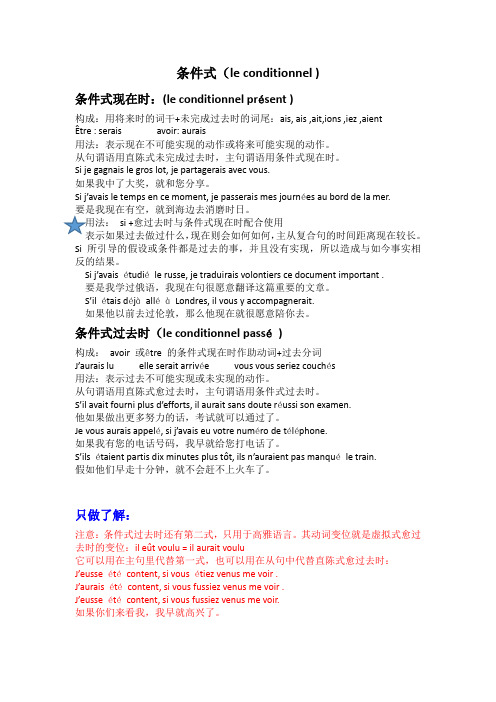
条件式(le conditionnel )条件式现在时:(le conditionnel présent )构成:用将来时的词干+未完成过去时的词尾:ais, ais ,ait,ions ,iez ,aientÊtre : serais avoir: aurais用法:表示现在不可能实现的动作或将来可能实现的动作。
从句谓语用直陈式未完成过去时,主句谓语用条件式现在时。
Si je gagnais le gros lot, je partagerais avec vous.如果我中了大奖,就和您分享。
Si j’avais le temps en ce moment, je passerais mes journées au bord de la mer.要是我现在有空,就到海边去消磨时日。
si +愈过去时与条件式现在时配合使用现在则会如何如何,主从复合句的时间距离现在较长。
Si 所引导的假设或条件都是过去的事,并且没有实现,所以造成与如今事实相反的结果。
Si j’avais étudiéle russe, je traduirais volontiers ce document important .要是我学过俄语,我现在句很愿意翻译这篇重要的文章。
S’il étais déjàalléàLondres, il vous y accompagnerait.如果他以前去过伦敦,那么他现在就很愿意陪你去。
条件式过去时(le conditionnel passé)构成:avoir 或être 的条件式现在时作助动词+过去分词J’aurais lu elle serait arrivée vous vous seriez couchés用法:表示过去不可能实现或未实现的动作。
条件式现在时和过去时

条件式现在时和过去时在沪江关注法语的沪友chenjiaqi222遇到了一个关于法语语法的疑惑,已有2人提出了自己的看法。
知识点疑惑描述:条件式现在时和过去时用在独立句中,表示委婉请求,常用动词(vouloir、pouvoir、aimer),那怎么区分什么时候用哪一种?eg:'aurais aime partir demain: c'est possible?ne pourriez vraiment pas me trouver une place?另外,考试中选填条件式现在时或过去时,有哪些特别要注意的区别呢语法书都快看蒙了。
怎么感觉两个差不多。
谢谢知识点相关讲解条件式现在时和过去时比较明显的区别在于:条件式现在时是未完成体,指现在或将来可能做的事;条件式过去时是完成体,指现在、将来或过去可能已做完的事。
例如:Un tel travail demanderait plusieurs mois.(这样的活儿可能得干好几个月。
)Un tel travail aurait demandé plusieurs mois.(这样的活儿可能用了好几个月。
)只能用条件式现在时的情况:①表示愿望,希望,例如:Félix et Béatrice aimeraient avoir un deuxième enfant. (Félix et Béatrice希望生第二个孩子。
)②一个想象的动作,例如:Julien rêve d’habiter à Paris. Son appartement se trouverait au Quartier latin, ses fenêtres donneraient sur un jardin.(Julien梦想住在巴黎,公寓能建在拉丁区,窗户可以朝向花园。
)③表示建议,用于下列动词的条件式现在时:devoir+不定式;faire mieux de +不定式;valoir mieux+不定式/que+虚拟式。
法语动词变位现在时过去时将来时
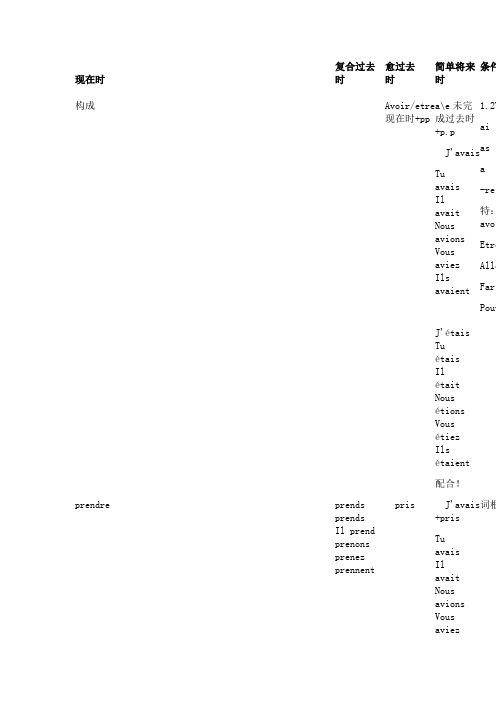
现在时复合过去时愈过去时简单将来时条件式现在时条件式过去时构成Avoir/etre现在时+pp a\e未完成过去时+p.pJ'avaisTuavaisIlavaitNousavionsVousaviezIlsavaientJ'étaisTuétaisIlétaitNousétionsVousétiezIlsétaient配合!1.2V:V+ai onsas eza ont-re: 去e+上特:avoir-j’auraiEtre-je seraiAller-j’iraiFarie-je feraiPouvoir-pourrai简单将来时词根+ais ionsais iezait aienprendre prendsprendsIl prendprenonsprenezprennent pris J'avais+prisTuavaisIlavaitNousavionsVousaviez词根:prendr- 词根:Prendr+Ils avaientdire disdisditdisonsditesdisent + dit 结构+dit词根:dir- 词根:dir-devoir Je doisTu doisIl doitNousdevonsVous devezIlsdoivent +dû结构+dû词根:devr- 词根:devrrecevoir reçoisreçoisreçoitrecevonsrecevezreçoivent + reçu结构+reçu词根:recevr- 词根:recevr-partir Je parsTu parsIl partNouspartonsVouspartezIlspartent Je suispartiTu es partiIl estpartiNoussommespartisVous êtespartisIls sontpartisJ'étaispartiTu étaispartiIl étaitpartiNousétionspartisVousétiezpartisIlsétaientpartis词根:partir- 词根:partir-etre Je suisTu esIl estNoussommesVous êtesIls sont J'aiTu asIl aN avonsV avezIls ont+étéJ'avaisétéTu avaisétéIl avaitétéN avionsétéV aviezétéIlsavaientétéJe seraiTu serasIl seraNous seronsVous serezIls serontJe seraisTu seraisIl seraitNous serionVous seriezIls seraienvoir Je voisTu voisIl voitNousvoyonsVous voyezIls voient+ vu 结构+ vu 词根:verr- 词根:verr-aller Je vaisTu vas Je suisalléJ'étaisalléj'iraiTu irasj'iraisTu iraisIl va Nous allons Vous allez Ils vontTu es allé Il est allé Nous sommes allés Vous êtes allés Ils sont allés Tu étais allé Il était allé Nousétionsallés Vous étiezallés Ils étaient allésIl ira Nous irons Vous irez Ils iront Il irait Nous irions Vous iriez Ils iraientvenirJe viens Tu viens Il vient Nous venons Vous venez Ils viennentsuis venu es venu est venu sommes venus êtes venus sont venusJ'étais venuTu étais venu Il était venu étionsvenusétiezvenusétaient venus词根:viendr-词根:viendr voyageJe voyage Tu voyages Il voyageNousvoyageons Vous voyagez+ voyagé 结构+ voyagé 词根voyager-词根:voyager-IlsvoyagentfaireJe fais Tu fais Il fait Nous faisons Vous faites Ils font+fait J'avais fait Tu avais fait Il avait fait avions fait aviez fait avaient faitJe ferai Tu feras Il fera Nous ferons Vous ferez Ils feront Je ferais Tu ferais Il ferait Nous ferion Vous feriez Ils feraienavoirj'ai Tu asIl aNous avons Vous avez Ils ont+euJ'avais eu Tu avais eu Il avait eu avions euj'aurai Tu auras Il aura Nous aurons Vous aurez Ils auront j'aurais Tu aurais Il aurait Nous aurion Vous auriez Ils auraienaviez eu avaient eudonner donnéAvoir 未完成+donné Donner+ ai onsas ez a ontJe donnerai Tu donnerai Il donnerai Nousdonnerions Vousdonneriez IlsdonneraientsavoirJe sais Tu sais Il sait Nous savons Vous savez Ils savent+ su J'avais suTu avais suIl avait suN avions suV aviez su Ils avaient su词根:saur-词根:saur-saurais Tu saurais Il saurait Nous saurions Vous saurie IlssauraientFinir finisfinisfinitfinissonsfinissezfinissent ai finias finia finiavons finiavez finiont finiJ'avaisfiniTu avaisfiniIl avaitfiniavionsfiniaviezfiniavaientfiniJe finiraiTu finirasIl finiraNous finironsVous finirezIls finirontJe finiraisTu finiraisIl finiraitNousfinirionsVousfiniriezIlsfiniraientpouvoir peuxpeuxpeutpouvonspouvezIpeuvent + pu J'avais+puTuavaisIlavaitNousavionsVousaviezIlsavaient词根:pourr- 词根:pourrsortir sorsTu sors Je suissortiJ'étaissorti词根:sortir- 词根:sortirIl sort Nous sortons Vous sortez Ils sortentTu es sorti Il est sorti sommes +sortis êtessortissontsortisTu étais sorti Il était sorti étionssortisétiezsortisétaientsortisrecevoirJe reçois Tu reçois Il reçoit recevons recevez reçoivent+ reçu 结构+reçu词根:recevr-词根:recevrrevenirreviens Tu reviens Il revient suis revenu es revenu J'étais revenu étais词根:reviendr-词根:reviendr-Nous revenons Vous revenez IlsreviennentIl est revenu sommes revenus êtesrevenus sont revenusrevenu était revenu étions +revenus étiez revenus étaient revenusarriverj'arrive Tu arrives Il arrive Nous arrivons Vous arrivez Ils arrivent Je suis arrivé Tu es arrivé Il est arrivé Nous sommes arrivés Vous êtes arrivés Ils sont arrivés J'étais arrivé Tu étaisarrivé Il était arrivé Nous étions arrivésVous étiez arrivés Ilsétaient arrivés词根:arriver-词根:arriver-pleuvoir 只有 Il pleut无 无 Il pleuvra Il pleuvraivoyagerJe voyage Tu voyages Il voyage+ voyagé 结构+ voyagé 词根:voyager-词根:voyager-NousvoyageonsVousvoyagezIlsvoyagentréserverJe réserv e Tu réserves Il réserve Nous réservons Vous réservez Ils réservent + réservé 结构+ réservé 词根:réserver - 词根:réserver - acheter j'achète Tu achètes Il achète Nous achetonsVous acheté 结构+ acheté词根:achèter - 词根:achèter -Ilsachètentjouer +joué结构+joué词根:jouer- 词根:jouerécrire j'écrisTu écrisIl écritNousécrivonsVousécrivezIls +écrit结构+écrit词根:écrir- 词根:écrirposer posé结构+posé词根:poser- 词根:poserraconter + raconté结构+raconté词根:raconter- 词根:raconter-visiter+ visité -结构+ visité 词根:visiter 词根:visite devenirJe deviens Tu deviens Il devient Nous devenons Vous devenez Ils deviennent Je suis devenu Tu es devenu Il est devenu Nous sommes devenus Vous êtes devenus Ils sont devenus J'étais devenu Tu étais devenu Il était devenu Nous étions devenusVousétiezdevenusIls词根:deviendr- 词根:deviendr-étaient devenusNaître Je naisTu naisIl naîtNousnaissonsVousnaissezIlsnaissent Je suis néTu es néIl est néNoussommes nésVous êtesnésIls sontnésJ'étaisnéTu étaisnéIl étaitnéNousétionsnésVousétieznésIlsétaientnés词根:naîtr- 词根:naîtrS’appeler j'appelleTuappellesIl appelleNousappelonsVousappelezIlsappellent。
- 1、下载文档前请自行甄别文档内容的完整性,平台不提供额外的编辑、内容补充、找答案等附加服务。
- 2、"仅部分预览"的文档,不可在线预览部分如存在完整性等问题,可反馈申请退款(可完整预览的文档不适用该条件!)。
- 3、如文档侵犯您的权益,请联系客服反馈,我们会尽快为您处理(人工客服工作时间:9:00-18:30)。
GRAMMAIRE
条件式现在时
I构成:直陈式简单将来时的词尾换成直陈式未完成过去时的词尾
II用法:
1.用在复合句中,主句动词用条件式现在时,si引导的条件从句动词用未完成过去时,表示现在不可能实现而将来有可能实现的动作。
相当于英语中表示现在或将来情况的虚拟条件句。
1)表示与现在事实相反:Si j’étais vous, j’irais chez le dentiste tout de suite.
2)表示将来可能实现的动作:Est-ce que cela t’ennuierait beaucoup si nous allions au cinéma un autre jour ?
如果动作实现的可能性极大,则主句用直陈式简单将来时,从句用直陈式现在时。
相当于英语的真实条件句:
S’il fait beau demain, nous irons au parc prendre des photos.
条件从句也可由其他表示条件的词组代替:
A votre place, j’apprendrais le français comme seconde langue étrangère.
Avec des si, on mettrait Paris dans une bouteille.
2.用在独立句中,表示愿望、请求、建议、推测,表达委婉语气;相当于英语中情态动词用法
J’aimerais faire le tour du monde. (I’d like to travel round the world.)
Pourrais-je écouter cette cassette avant de l’acheter ? (Could I listen to this cassette before buying it ? )
V ous feriez mieux de suivre le conseil du médecin. (You’d better follow the doctor’s advice.)
3.用作直陈式过去将来时,表示过去某一动作之后将要发生的事情,相当于英语的一般过去将来时。
Ses parents ne savaient pas si le train arriverait à l’heure.
Le professeur a dit qu’on aurait un examen le lendemain.
条件式过去时
1.构成:
avoir (条件式现在时)+ 过去分词:j’aurais parlé
être je serais allé (e )
parler
j’aurais parlénous aurions parlé
tu aurais parlévous auriez parlé
il aurait parléils auraient parlé
elle aurait parléelles auraient parlé
aller
je serais allé (e ) nous serions allés (es )
tu serais allé (e ) vous seriez allé (e ) (s ) (es )
il serait alléils seraient allés
elle serait allée elles seraient allées
se lever
je me serais levé (e ) nous nous serions levés (es )
tu te serais levé (e ) vous vous seriez levé (e ) ( s ) ( es )
il se serait levéils se seraient levés
elle se serait levée elles se seraient levées
2.用法:用在表示结果的主句中,条件从句由si引导,其谓语用直陈式愈过去时;表示可能实现而实际未实现,相当于英语中的虚拟。
Si j’avais su qu’il était aussi à Paris, je serais allé le voir.
V ous auriez bien ri si vous aviez su le détail de cette aventure !
Sans l’accident, ils seraient arrivés à l’heure.
Dans ces conditions, elle aurait réussi à l’examen.
在独立句中表示可能已经发生,但未肯定,多见于新闻报道:
On aurait envoyé un homme dans la Lune.
Un accident d’avion aurait eu li eu au-dessus de la Méditerranée.
在从句中,作直陈式过去先将来时,表示过去时间里一个先完成的将来动作;相当于英语的过去将来时或过去完成时。
Mon ami m’a demandé si j’aurais fini mon travail avant les vacances.
Elle m’a promis qu’elle me donnerait son opinion dès qu’elle aurait lu ce roman.。
